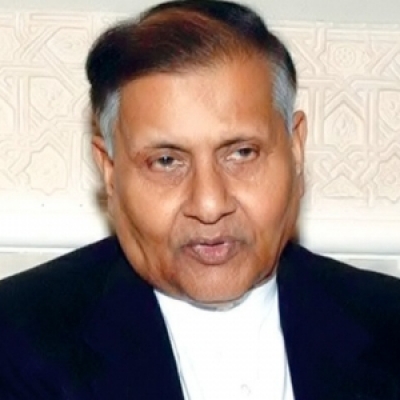



 Mirza Aslam Beg
Mirza Aslam BegAs foreign occupation forces prepare to leave Afghanistan, a former Pakistani army chief, General Mirza Aslam Beg thinks Pakistan and Afghanistan can work together to bring peace to the troubled country.
The fast changing scenario in Afghanistan gives hope that the post-1990 conspiracies that have tormented the Afghans for so long may not be repeated as foreign occupation comes to an end. Therefore, the factors determining the future destiny of Afghanistan need to be analyzed, keeping in mind the conspiracies of the past, which prevented the peaceful transfer of power after the Soviet retreat. That led to a civil war that threw-up the Taliban as redeemers but they too were cut down by the invading forces in October 2001.
Then followed the 13-year brutal war of occupation, which has now ended along with the conspiracies that had prevented the Afghans from forming a government of their choice, one that could possibly guarantee lasting peace in the war-ravaged country. The recently held Heart of Asia Conference in Beijing (October 28–31, 2014) set sights for the future and also identified the factors that could lead Afghanistan into a new era of peace and stability. The factors under focus are:
1. The Taliban have emerged as winners in the US-NATO imposed war and have shown maturity of judgment and political wisdom to lead the Afghan people to their new destiny. They are prepared to negotiate peace with the new Unity government of President Ashraf Ghani in Afghanistan.
2. Mullah Umar’s words of wisdom, which I have often quoted, indicate the fundamental direction, “Let the occupation forces leave and then we will take decisions in a free environment acceptable to the entire nation. We are not going to fall prey to the machinations of our enemies who destroyed our unity in the past.”
3. An Intra-Afghan dialogue was held in Paris in December 2012 at the Foundation for Strategic Research where the participants — the Taliban, Northern Alliance and representatives of then President Hamid Karzai — gave solid affirmation to Mullah Umar’s resolve. A peace process roadmap to 2015 was drawn up, envisaging a role for Pakistan supported by the United States. They also resolved “to remain united, working for a broad-based government, for peace in Afghanistan.” This is the on-going process now.
4. The new Afghan government, under President Ashraf Ghani has taken all the positive steps, confirming decisions taken by the 2012 High Peace Council at Paris.
5. President Ashraf Ghani has declared that the future of Afghanistan will be decided in a very selective manner and in close coordination with its six neighbors of the Inner-Circle, namely Pakistan, Iran, China, Russia and the Central Asian countries. All others are expected to support his initiative.
6. The Pak-Afghan historical and civilizational bonds are emerging stronger, and reject the machinations of outsiders into the affairs of the two countries.
7. The United States, forced by circumstances, has shifted its Strategic Pivot to the Asia Pacific region. It has reconciled with the emerging changes in Afghanistan and specifically supports Ashraf Ghani’s concept of “Unity at the Heart of Asia,” and his initiative to forge closer relations with Pakistan. India has been assigned a new role as leading partner in the Asia-Pacific Coalition against China (just as Israel has since its creation played the US-Western-assigned role as gendarme in the Muslim East).
These are positive signs that promise peace and stability in Afghanistan. They will extend into Pakistan to bring to an end state-sponsored terrorism from the Afghan soil. Also coming to an end will be the US obsession to establish India as the dominant power from the region encompassing from Kabul to Dhaka. Thus, the immediate neighbors of Afghanistan, of the Inner Circle, have a common cause of establishing regional peace to provide the much-needed balance of power in the heart of the Asian region.
Pakistan’s foreign policy determinants are being set forth in a style and manner that is not apologetic anymore. General Raheel Sharif rushed to Kabul with the request to tell the Indians to wind-up their conspiracy network operating against Pakistan since 2005 and also to curb the Pakistani terrorists operating from Afghan soil. General Raheel went to Britain to tell them that it was not the first time the “London Plan” had emerged from its soil and that there was solid proof Pakistani dissident groups were being harbored and funded by sources in Britain, which must stop. Earlier on, he spent two weeks in the US explaining to them the emerging realities in the Heart of Asia and Pakistan’s concerns about the security challenges to the country.
The Americans don’t seem to have a foreign policy of their own. American Foreign Secretary John Kerry visited Pakistan and his foreign policy initiatives appeared fully subsumed to and supportive of India on the issue of Kashmir. Regarding Afghanistan, he repeated the old demand of Pakistan “to do more” against the Haqqani network and the Afghan Taliban, as if the decision to join the US war against Afghanistan was still valid. It is time for the US to adopt a policy in harmony with the emerging realities in the region.
The war on terror is also approaching a decisive end and insha’allah, Pakistan’s objectives will soon find harmony with the foreign policy objectives of the countries of the Inner Circle. This is a big step forward.
General Mirza Aslam Beg is the former Chief of Army Staff of Pakistan.
